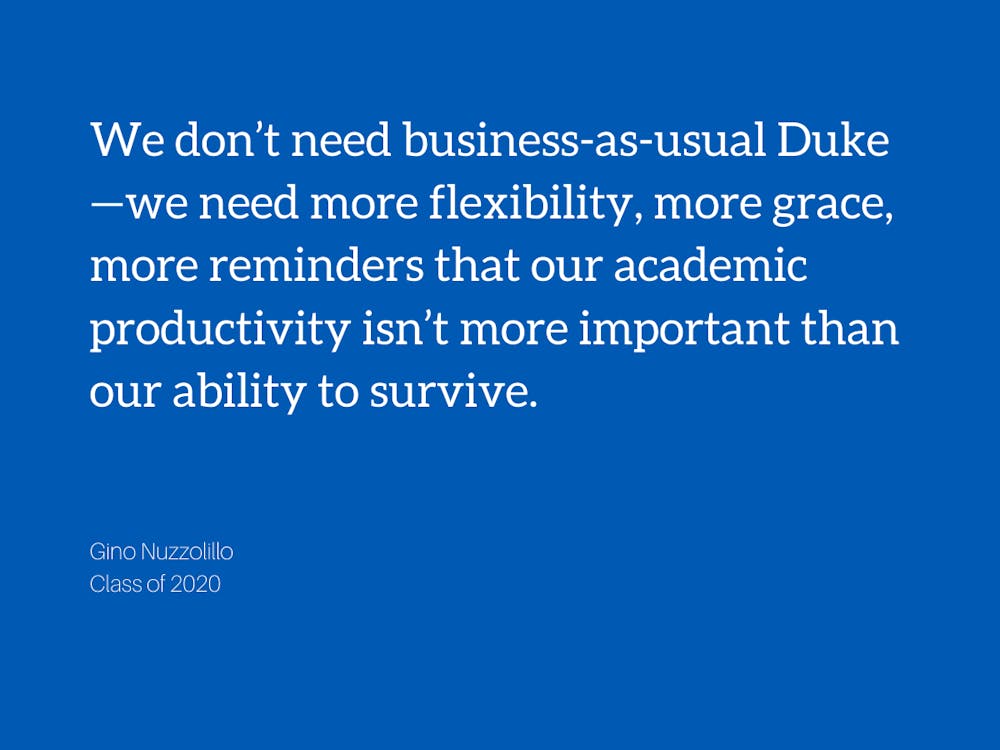I am in denial.
A month ago, I sat on a park bench in lower Manhattan and watched my screen as New York state officials declared a COVID-19 state of emergency. A day later, I called my Dad when Duke sent the first tentative emails unraveling our semester—I told him not to worry, that there was no crisis, that an extended Spring Break and online classes were probably temporary, that I would return to Durham and life would continue normally.
A few days later in Denver, while I stayed with my mom’s family, the death toll rose. More university emails sent me into a panic about my housing and belongings. I coped by raiding my grandfather Boppy’s closet for his vintage sweaters. I tried to help other students and community members with what I naively hoped were only temporary crises. States and cities shut down, Duke canceled graduation, millions lost their jobs, indefinite social distancing and isolation set in.
I still believed I would see my friends. I still woke up telling myself the panic would subside in a few weeks. I still attempted to write my thesis, apply for jobs, set ambitious goals in my classes, read—after all, I was supposed to Keep Learning and Keep Working as normal, just online. I still checked the Johns Hopkins coronavirus tracker twice a day. As the United States overtook China and Italy to become the epicenter for this global pandemic, I found multiple ways to dissociate from reality (some not fit to print).
I was in denial. I still am. Duke is, too.
This pandemic and its consequences will become worse. There is no “normal” to Keep or return to. Best case projections still predict overrun hospitals, hundreds of thousands taken by the virus (not to mention those now denied treatment for their pre-existing medical needs), and months until a vaccine can be produced on a mass scale. Public health officials warn us that the hardest-hit cities, like New York and New Orleans, have not yet reached their peak number of infections—outbreaks and intense waves of the virus are likely to continue for the rest of the year, if not longer. Close to 10 million unemployment claims have been filed. The pain, fear and anxiety that so many of us now confront is unimaginable. Moreover, pervasive social and economic inequality ensures the consequences of COVID-19 are worse for the poor, for communities of color (by initial data, specifically Black people), and for women. And this is still only the beginning.
We are experiencing something unprecedented. We worry more about immunocompromised family members and friends in the face of an unknown and highly infectious disease. We, or someone we care about, are living in an unhealthy and stressful home, becoming the caretaker for younger siblings or elders, cut off from friends and counselors and stable routines, losing jobs and internships, and shouldering the same rigorous academic load on that godforsaken platform called Zoom. As if this moment is just a temporary inconvenience. We will see members of our communities lose their jobs and perhaps their homes. We will see federal, state, and local governments ignore the unique vulnerabilities of our unhoused, incarcerated and undocumented neighbors. We will probably get sick. We will have to grieve in social isolation. No one knows how long it will last.
Our situation is bleak. I know this pandemic will ultimately fade, but I also know we confront immense suffering in the meantime. Taking care of ourselves, our families and our communities now takes highest priority. Creating space to grieve, to mourn the myriad consequences of this pandemic in our lives, in our community’s lives, takes highest priority.
Yet, Duke has asked us to Keep Learning, Keep Teaching and Keep Working, to keep being productive “despite the unprecedented challenges,” to pretend that we could replicate Duke virtually. This messaging does not put our community’s well-being first. Instead, Duke’s notion of productivity is rooted in denial about what will happen as this pandemic grows worse. It is symptomatic of a campus stuck in a toxic, individualist, hyper-competitive mindset. We aren’t taught to question the underlying assumption that academic accomplishment and career ambition still come first.
We don’t need business-as-usual Duke—we need more flexibility, more grace, more reminders that our academic productivity isn’t more important than our ability to survive.
We need policies like universal pass, the only equitable option, and canceled final exams.
We need more faculty members who recognize that their expectations must change, that their way of teaching must change.
We need robust and sustainable resources to help meet our basic needs, unexpected costs, and lost incomes—beyond Summer 2020.
The idea that we can “Keep” on gets in the way of making these necessary changes now, and makes us less flexible to deal with the more serious challenges we have yet to face. Faculty, deans, administrators: please read the room. Keep Learning, Keep Teaching, Keep Working keeps us in denial. Make the rest of the semester optional. Reimagine how we can put people first, rather than cling to an undesirable status quo.
Gino Nuzzolillo is a Trinity senior. His column usually runs on alternate Mondays.
Get The Chronicle straight to your inbox
Sign up for our weekly newsletter. Cancel at any time.

